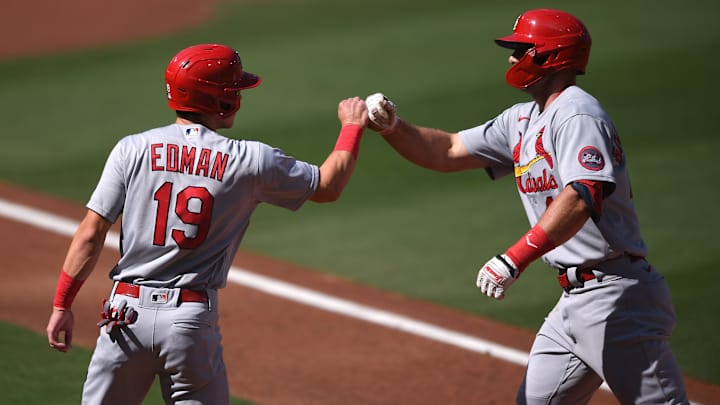The Cardinals, Padres and the Role Luck Plays in Postseason Baseball

Given the ubiquitous nature of advanced stats in baseball—from their utilization in front offices league-wide, to their accessibility to the average fan via resources like Baseball Savant—it’s clear that we live in an enlightened baseball world. It’s amusing now to think, not even 20 years ago, the notion of on-base percentage being an undervalued metric was considered cutting edge. But, like Brad Pitt-as-Billy Beane will tell you, it’s important to get on base, and the sport has progressed leaps and bounds since the Moneyball revolution of the early 2000s.
Yet with all of the data we have on hand, there’s still no clear-cut answer for how to harness postseason success. Beane himself has called it “f------ luck,” while the brightest minds from Harvard to Stanford have examined the role luck plays in October (and late-September) baseball. Their conclusion? That luck plays an outsized role in determining the eventual World Series champions—more so than in other sports—lending credence to Beane’s eloquently put assertion.
Far be it for a meager writer to contest the statistical analysis from a Harvard or Stanford alum. My retort to their findings, however, is simple: If the MLB playoffs are so random, then how the heck do the Cardinals keep doing this?
The Cardinals’ 7-4 win over the Padres on Wednesday was reminiscent of nearly every St. Louis postseason win in recent memory. Fans of the other 29 teams will loathe to read this, but the Cardinals did all the little things right en route to a Game 1 victory: they caught two Padres (Tommy Pham and Jake Cronenworth) trying to steal bases. A perfect throw to the cutoff man from Dexter Fowler helped nab Cronenworth trying to tag up from second to third in the sixth inning. And Cronenworth was involved in another base-running miscue in the eighth. Most importantly, St. Louis went 4-for-15 with runners in scoring position, while San Diego only managed to go 1-for-5.
The rookie and the vet: Dylan Carlson doubles in his first postseason AB and Yadier Molina brings him home in the @Cardinals' 4-run first. pic.twitter.com/KQ2cQUcbUa
— MLB Pipeline (@MLBPipeline) September 30, 2020
The ability to string hits together in the same inning—also known as cluster luck—was the focus of the Stanford study. The idea is simple: two teams each have nine hits (all singles) in a game. If Team A’s hits all come in the same inning, they are likely to score seven runs. If Team B has exactly one hit per inning, they’ll most likely be shut out.
The study found that teams that went to win the World Series in recent years all benefited from positive cluster luck compared to their regular season performances. Perhaps more critically, there was a weak correlation between regular season and postseason cluster luck, which is what you’d expect if stringing hits together is primarily based on good fortune. In other words, teams don’t appear to have as strong a hold on when their hits get bunched together as one might think.
Continuing to run with this theme, the cluster luck gods were unkind to the Padres on Wednesday. In the regular season, San Diego led the majors with a .311 average and 151 wRC+ with runners in scoring position. The Cardinals hit .246 (20th) in such situations, with a 96 wRC+ (26th).
The Padres also apparently have fallen out of favor with the BABIP gods. San Diego's expected batting average for Game 1 was .339, while the Cardinals' was .359. Unfortunately for the Friars, the outcome is decided by runs. A Padres optimist would point to those numbers as a sign that Wednesday’s clunker was an aberration, yet with no margin for error, such reassurances don’t carry much weight.
It’s easy to see why, from a Cardinals fan’s perspective, luck has little to do with what we’re seeing. This is simply The Cardinal Way, a special “It” factor ingrained in their DNA that has led to 11 World Series championships, most recently in 2006 and 2011, and deep playoff runs in 2012, 2013, 2014 and 2019. This year’s team was barely over .500 and outscored opponents by a mere 11 runs on the season. The Padres had the second-best winning percentage (.617) and run differential (+84) in the National League, yet here they sit on the brink of elimination.
Success in any field is, of course, not a crapshoot. The numbers say that luck carries greater importance during the MLB playoffs compared to other sports, but that does not invalidate the performance of winning teams. It certainly won’t make Wednesday’s loss go down any smoother for Padres fans, who are still in search of their first series win since 1998. Trailing 1-0, with Dinelson Lamet and Mike Clevinger out of duty, things certainly appear bleak.
But cheer up, San Diegans—in this game, your fortunes can change at a moment’s notice.

Nick Selbe is a programming editor at Sports Illustrated who frequently writes about baseball and college sports. Before joining SI in March 2020 as a breaking/trending news writer, he worked for MLB Advanced Media, Yahoo Sports and Bleacher Report. Selbe received a bachelor's in communication from the University of Southern California.
Follow NickSelbe